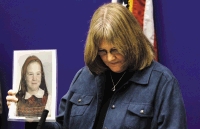By Chelyen Davis
The Free Lance-Star
January 28, 2011
http://fredericksburg.com/News/FLS/2011/012011/01282011/603671
 |
| Sex abuse victim Becky Ianni holds a photo of herself as a child at a legislative hearing. |
Victims of child sexual abuse would have more time in which to file civil suits under legislation in the General Assembly.
But not as much time as the bills originally proposed, after Virginia's two Catholic dioceses of Richmond and Arlington--which includes Fredericksburg--lobbied to lower it.
Virginia law gives victims two years after the abuse, two years after they turn 18, or two years after they realize they were abused, to file a civil claim against the perpetrator or institutions.
Two years is the statute of limitations for nearly all civil claims in Virginia, not just abuse.
The statute of limitations does not apply to criminal felonies.
The bills, as originally written, would extend the limit for civil cases to 25 years.
But the Catholic Church--which worldwide has been embroiled in lawsuits from victims who say priests abused them as children and the Church turned a blind eye--has argued that 25 years is too long.
Del. Dave Albo, R-Fairfax, who is sponsoring the statute of limitations bill, said he agreed to change the limit in his bill to eight years--eight years after the abuse, eight years after the child turns 18, or eight years after discovery of the abuse if the victim is an adult who has repressed memories.
That was at the Catholic Church's lobbying, he said, and he doesn't necessarily disagree that 25 years might have been excessive. But the argument isn't over.
"I think eight is too short," Albo said, adding that he will push for amendments to his bill and to a similar Senate bill to make the limit 15 years.
The Church's argument is that over time, witnesses die or move, evidence disappears, memories fade, and that it would be too difficult for alleged perpetrators to defend themselves after such a long time.
"It's extremely important to be fair to victims," said Jeff Caruso of Fredericksburg, who is the executive director of the Virginia Catholic Conference. "[But] there are very good reasons why a statute of limitations exists in the first place. When you get out to 25 years, that defeats the very good reasons."
Caruso said most states that have statutes of limitations in civil suits are on the lower end, mostly between three to five years. Very few states, he said, have limitations of 15 years or higher. He said eight years is reasonable but 15 would put Virginia "on the high end."
Supporters of the bill, though, say there should be no time limit to correct an injustice and punish an abuser for victims' years of suffering.
In a news conference yesterday, two victims of abuse by priests when they were children told of their years of self-blame, guilt and therapy. Both of them repressed those memories until they were adults.
"These memories stayed buried for close to 40 years until five years ago, at the age of 48, I came across a childhood photo of myself with my abuser," said Becky Ianni, Virginia director of the Survivors Network of those Abused by Priests. Ianni said her priest began abusing her when she was nine, living in Alexandria.
She said she has been treated for depression, anxiety and post traumatic stress disorder, and said that the suicide rate among people who were sexually abused is four times higher than the general population.
Mark McAllister, of Vinton, said he was abused by a priest who had been sent to his parish after abusing other children in New Jersey. The priest arrived with a new name, McAllister said, and no warning of the danger he might pose to children.
McAllister repressed the memories until his own son was born, he said. His abuser is awaiting trial in Missouri for abusing him and several other victims.
Both he and Ianni said many victims do not remember their abuse until middle age, and that it can take years for them to come to terms with it enough to seek justice --more years than the two allowed by law for civil suits.
"Time-barring of civil cases before victims typically are even capable of disclosure only perpetuates the secrecy, silence and sickness that predators and the Catholic hierarchy attempt to thrive on," McAllister said. "Eight years is not a reasonable time considering that victims of sexual abuse carry their wounds for a lifetime, a lifetime already shortened by the theft of their childhood."
Albo's bill has passed the House already, while a Senate bill is going through the committee process.
Chelyen Davis: 804/343-2245
Email: cdavis@freelancestar.com
Any original material on these pages is copyright © BishopAccountability.org 2004. Reproduce freely with attribution.